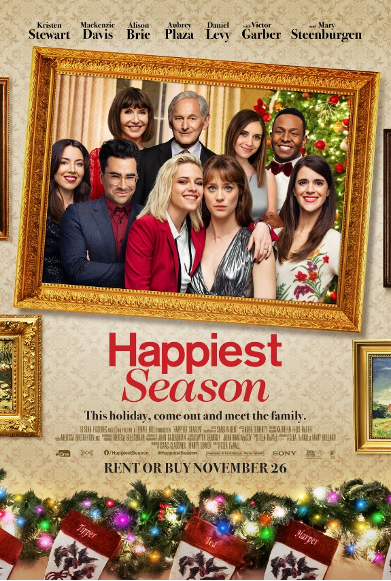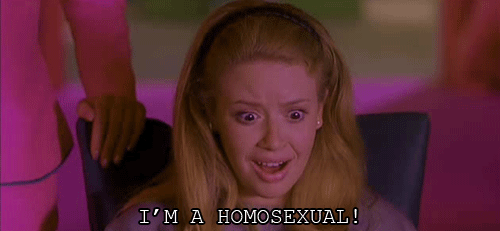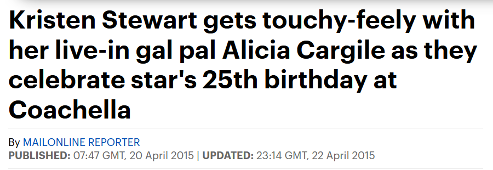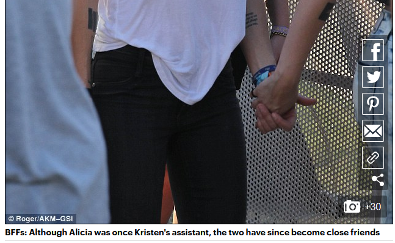Part I, inspired by hulu’s gay rom com Happiest Season
Author: Dr. Katrin Horn
December 2020
Holiday season calls for holiday movies and the most talked about holiday movie of 2020 might be lesbian rom com Happiest Season (To keep with the title’s theme of superlatives: the movie is also hulu’s biggest streaming success so far, it is the most high-profile movie among a surprisingly big selection of “queer holiday movies” – not something my representation-starved younger self ever expected to write –, and it stars Kristen Stewart in her most overtly gay role yet.) With a promo-campaign fit for the originally planned cinematic release, even many without a hulu-account will by now be familiar with the movie’s central premise. As Harper (Mackenzie Davis) tells her girlfriend Abby (Kristen Stewart) on the drive home for Christmas with her family: “I didn’t tell my parents I’m gay” (Trailer). Processing this news over the phone with her gay best friend John (Daniel Levy), Abby adds an additional twist: Harper’s parents think that Abby, too, is straight. In disbelief, John blurts out the trailer’s central punch line: “Have they ever MET a lesbian?!”
It’s supposedly the funniest line of the film (also because it is the ideal showcase for Daniel Levy’s comedic talent). And yes, in light of Abby’s hairstyle and wardrobe choices (and the casting of Kristen Stewart) the idea that she could be mistaken for straight is hilarious, but then again, …. it also isn’t.

tag line: “This holiday, come out and meet the family”

The premise of the joke rests on the comedic potential of being closeted. That the closet would be the defining feature of a romantic comedy in our current media environment is, and simultaneously is not, surprising. On the one hand, we supposedly live in a post-closet world which has made coming out narratives redundant. On the other hand, precisely this perceived progress has become fruitful new ground for negative stereotypes of queer representations: if queer people do not quite cut it as villains anymore in the way that they used to, it seems, closeted characters had to take up the slack. Equally tragic as earlier representations of queer characters as isolated and repressed (and, often, destructive), contemporary “closet cases” derive their deviance not from their sexuality, but from keeping it a secret (Hilton-Morrow/Battles 174).2In her book The Tolerance Trap (a treatise against the acceptance of the post-gay utopia) Suzanna Danuta Walters, too, observes new closet-dynamics in TV and movies which Happiest Season’s plot fits perfectly. Recent media, Walters claims, portray “the conflict not simply as an internal one or one between a closeted person and his or her unknowing family but now between a closeted person and his or her out and proud lover” (37). Another case in point with a release only this past month would be Amazon Prime’s YA adventure series The Wilds.
Thus, while singular examples such as But I’m A Cheerleader (in which Happiest Season’s director Clea DuVall had her breakthrough role) have played the trope to its hilarious camp extremes (Horn), being closeted in general seems to be the kind of failure that’s more uncomfortable than funny.
That discomfort stems, to a large degree, from the closet’s embeddedness in social hierarchies: the closet has long been a powerful structure of knowledge and ignorance that keeps those in check who might question the heteronormative matrix by interrupting its eloquent silence. Within the film, the answer to John’s rhetorical question would be that, of course, Harper’s parents (Victor Garber, Mary Steenburgen) have met a lesbian – several, in fact: their daughter Harper, their daughter’s ex-girlfriend Riley (Aubrey Plaza), and now their daughter’s current girlfriend Abby. But this isn’t about lived experience. It’s about knowledge and privilege. As Terry Castle noted almost thirty years ago, “many people have trouble seeing what’s in front,” when it comes to lesbians (Castle 2). Or, as Eve Kosofsky Sedgwick claimed exactly thirty years ago: “the fact or pretense of ignorance” is itself a form of “discursive power” (6). Harper’s parents’ steadfast refusal to see anything but sure signs of heterosexuality exudes their “epistemological privilege of unknowing” (5). Sure, they’ve met a lesbian. But why should they admit that?
As proposed in our network’s application material, one aim of our shared research is to investigate how “the very structures and systems of knowledge are instrumental in producing normative assumptions and hierarchies that disqualify certain subject positions as ‘failed’.” The closet is exactly such an epistemological structure, and the subject positions which are disqualified as “failed” via its reign are myriad: Being in the closet is often construed as a failure in and of itself – either as of not knowing oneself or not letting others know oneself. The metaphor itself suggests that being in the closet is “difficult, unnatural, dark, precarious, isolating, and probably doomed to failure” (Kushnik 679). Coming-out narratives in contrast, “are confessional in nature, presenting coming out as an issue of honesty and as a linear process” (Hilton-Morrow/Battles, 168). They thus turn knowledge (or acknowledgment) into an identity.
The post-closet utopia envisioned in Happiest Season’s promotional material
Connected to this: Coming out is seen (problematically) as the responsibility of queer people who would otherwise be themselves to blame for their invisibility – cue Happiest Season, in which Harper is forced out of the closet by her sister in the movie’s emotional showdown, and then … nothing happens. Quite the contrary, her ultra-conservative image-obsessed family is actually “healed” by Harper’s coming out. Everyone’s a bit happier afterwards. There are no repercussions, no loss, no pain … Harper’s closet really was her individual failure.3John’s moment of introspection, reminding Abby of his father’s rejection, is the only moment in which the movie takes serious the potential harm caused by coming out. Yet as Michael Warner stresses: “We blame people for being closeted. But the closet is better understood as the culture’s problem, not the individual’s. No one ever created a closet for him- or herself” (52). The closet is thus strictly a cultural agreement, a set of heteronormative assumptions, a public regulation of what can and should be known. No matter how unlikeable Harper is in the movie (spoiler: very), at least this one thing is not her fault: the heteronormative matrix in which she is forced to exist.
To complicate matters beyond the movie itself: coming out, too, has been read as a failure. It does, after all, uphold heteronormative standards of only selectively enforced disclosure (straight people, as a rule, do not come out such). As Judith Butler has argued: “For being ‘out’ always depends to some extent on being ‘in’; it gains its meaning only within that polarity. Hence, being ‘out’ must produce the closet again and again in order to maintain itself as ‘out.’ … and the closet produces the promise of a disclosure that can, by definition, never come” (16). That, too, is reflected in Happiest Season, where Harper’s coming out is the pivotal moment of recognition: once she’s out as gay, there’s nothing else to know. Her family, finally confronted with the disclosed secret of their daughter’s/sister’s sexuality, can move on. Abby and Harper can reunite. Yet as Butler stresses: opacity hasn’t been lifted, the “locus of opacity has simply shifted” (16)— the family, Abby, the audience … they all still don’t ‘know’ Harper. Without the acceptance of the closet’s simply polarity, however, there would be no plot: Abby could not simply be un-outed for comedic (or tragic) effect, the contrast between Riley and Harper or between Abby’s chosen family and Harper’s biological family wouldn’t work, a temporal structure of “before and after coming out” couldn’t serve as the movie’s principle basis for its happy ending. Primarily for that latter reason, Happiest Season is exclusively invested in the closet as failure – Harper’s coming out clears the path for the movie’s rom com finale of the leads’ engagements and everyone’s shared holiday celebrations.
Yet for a complication of the matter and an exploration of the closet’s “damned if you do, damned if you don’t” conundrum, we need not look further than the star persona of its lead actress. Kristen Stewart is heralded as one of the most high-profile out stars in Hollywood. Accordingly, in the lead-up to Happiest Season’s release, she has been invited to comment on all things gay, from the ‘controversy’ of whether LGBTQ roles should only be played by (out) LGBTQ actors and actresses (short version: no) to her own coming out (short version: it’s complicated). All that, however, has only been possible relatively recently. Despite Stewart’s presence in the spotlight since her teenage years and her public relationships with women since at least 2014, her status as “out” seems to have registered with mainstream media as late as 2017 – a delay that has a lot less to do with individual choices, and a lot more with knowledge structures that demand very different levels of evidentiary basis for straight and queer sexualities to be “knowable.”


The mid 2010s’ “gal pal epidemic” (in which Stewart featured prominently), for example, might be the most recent installment of a long series of celebrity reporting that proved the “elasticity of heterosexist presumption” (Sedgwick 1990, 46) even as the US supposedly entered the post-closet era. The euphemism of ‘gal pal’ that both denied sexual relationships and hinted at their possibility wasn’t limited to (online) celebrity gossip. Yet that’s where it originated and was most overt; so overt in fact that it spawned several memes in which LGBTQ fans seemed to wonder about mainstream media – like John about Harper’s parents –: “Have they ever MET a lesbian?!”
In part II of my thoughts on the closet as failed knowledge, I therefore want to sketch how the premises of upholding the open secret of celebrities’ sexualities has shifted as avenues of knowing stars have increased exponentially. Looking at this in a diachronic perspective that spans back to the US’ first queer superstar, Charlotte Cushman, it becomes apparent how little has changed. Contemporary celebrity gossip seems stuck in the closet’s epistemological structures, just like Happiest Season seems stuck in the vilification of closeted characters. And so, Happiest Season might not be the rom com we wanted and expected in 2020, but maybe it’s the #knowledgefailure case study I needed to connect my research to the current moment.
Read Pt. II, inspired by Apple’s Podcast Wild Things. Siegfried & Roy
Notes:
- 1
- 2In her book The Tolerance Trap (a treatise against the acceptance of the post-gay utopia) Suzanna Danuta Walters, too, observes new closet-dynamics in TV and movies which Happiest Season’s plot fits perfectly. Recent media, Walters claims, portray “the conflict not simply as an internal one or one between a closeted person and his or her unknowing family but now between a closeted person and his or her out and proud lover” (37). Another case in point with a release only this past month would be Amazon Prime’s YA adventure series The Wilds.
- 3John’s moment of introspection, reminding Abby of his father’s rejection, is the only moment in which the movie takes serious the potential harm caused by coming out.
Works Cited:
Butler, Judith (1991). “Imitation and Gender Insubordination.” Inside/Out: Lesbian Theories, Gay Theories, ed. Diana Fuss. New York: Routledge.
Castle, Terry (1993). The Apparitional Lesbian. Female Homosexuality and Modern Culture. New York: Columbia UP.
Hilton-Morrow, Wendy and Kathleen Battles (2015). Sexual Identities and the Media. An Introduction. New York: Routledge.
Horn, Katrin (2017). Women, Camp, and Popular Culture. Serious Excess. Basingstoke: Palgrave.
Kushnick, Hannah L. (2010). “In the Closet—A Close Read of the Metaphor.” Virtual Mentor (American Medical Association Journal of Ethics), vol. 12, no. 8: 678-680.
Sedgwick, Eve Kosofsky (1990/2005). Epistemology of the Closet. Reprint. Berkeley: U of California P (A Centennial book).
Walters, Suzanna Danuta (2014). The Tolerance Trap. How God, Genes, and Good Intentions are Sabotaging Gay Equality. New York: NYU Press.
Warner, Michael (2010). Publics and Counterpublics. New York: Zone Books.
